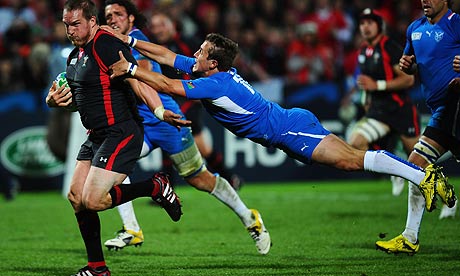
Now that the memory is still fresh and the jet lag has faded, it seems worthwhile looking four years down the road to the next World Cup and how England might be thinking of matching the past two months in New Zealand. Matching? Actually, that's a moot point. Finding another route might be a better question.
This was my first World Cup, so I have little with which to compare New Zealand 2011. However, I have spoken to plenty who have been to others and the universal judgment is that while it might not have been the best yet, it was one huge success. For those organising England 2015, the bar has been set pretty high.
Actually, the challenge could not be more different, if only because of the expectations. We went to New Zealand wondering what was round the corner; there were reports of tickets unsold, rip-off prices in hotels, lack of hotels and cruise ships being hired to help cope with those punters who couldn't get rooms.
In short, we arrived not knowing what to expect, but pretty soon found a country which had totally immersed itself in the tournament to the extent of switching the school holidays so that students and pupils could take a much more proactive part. In turn that meant that most of the grounds were close to being full and that all the games were played in an infectious atmosphere.
Whether that will happen in England in four years time, I don't know. What I do know is that the New Zealand government was prepared to take something of a hit to stage the World Cup – believing it was the last chance for such a small country – whereas we are looking for something spectacularly different. And a profit.
Instead of small is beautiful, read big is necessary to pay the bills.
As I understand it, Twickenham reckons that over 48 games it has to average gates of 58,000; that's an average greater than the capacity of all bar one – Eden Park, Auckland – of the 12 grounds used in New Zealand.
Part of the joy of playing there was that they seemed to have a stadium to fit every bill. The Whangarei in the far north was perfect as a venue for Tonga versus Canada – whose win turned out to be one of the first surprises of the tournament – but could not have been expected to sell out more than its 20,000 capacity.
The Waikato in Hamilton, our base and the venue for Wales's games against Samoa and Fiji, is one of the more famous stadiums in the land, but it still holds only 30,000 and that was perfect for our games. The same for the Taranaki in New Plymouth, where 26,000 was just about right for our match against Namibia and even the Cake Tin in Wellington, where we opened against South Africa, holds only 40,000, and that's in the capital city.
The point being that they matched the occasion. They may not have been full, but the gaps weren't obvious, whereas Italy versus Russia in one of the bigger football grounds in England is hardly likely to create the party atmosphere found at most of the New Zealand venues. I can understand that stadiums such as Old Trafford will be needed to generate the cash, as they were in France four years ago, but it's hard to imagine too many matches filling 76,000 seats in an area not really known as a rugby heartland.
So here's to the man handling the marketing; he has a job on his hands and not a lot he can steal from the Kiwis, who don't need much persuading to stop and watch evenpark or schools rugby.
In England the rugby areas are limited and the next four years will have to be approached with something like missionary zeal if were are to create the enthusiasm seen in places like Wellington and Auckland, where there was dancing in the streets on quarter-final weekend.
Here are three ideas we might borrow. The first is the volunteer stewarding that made life so easy from first to last. Initially the pale-blue uniforms tended towards the slightly naff. However, very soon the sight of one proved particularly reassuring, especially when trying to exit stadiums around midnight.
Secondly, the culture of the camper-van. If I'd known then what I know now, I would have invested in a hire company and I can't see why they should not be as big a success over here as they were for the less-well-off fan down there.
Finally, it helps if the domestic audience is convinced their side are going to win. Very few New Zealanders needed bribing with discount or bonus tickets when they were sure the All Blacks were on course for the Webb Ellis Cup. A winning England side would help a bundle with the selling of 2015.

